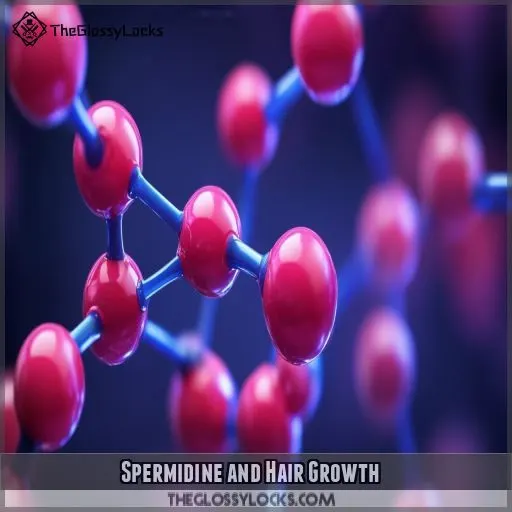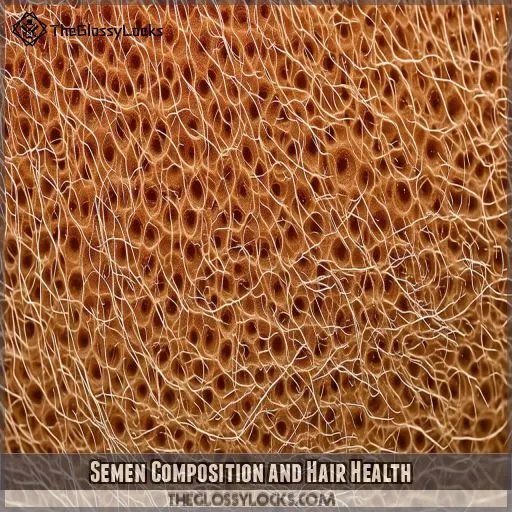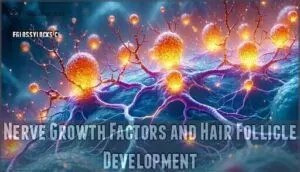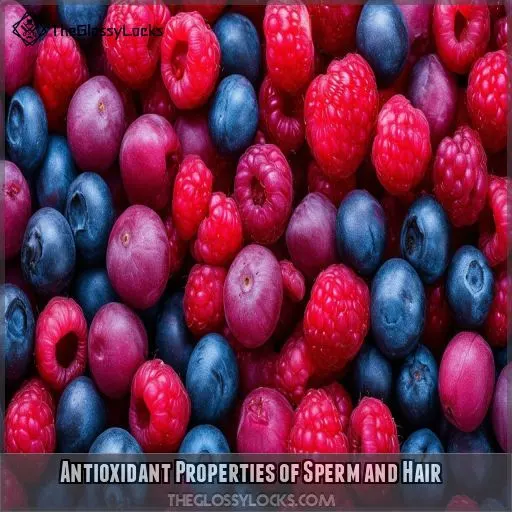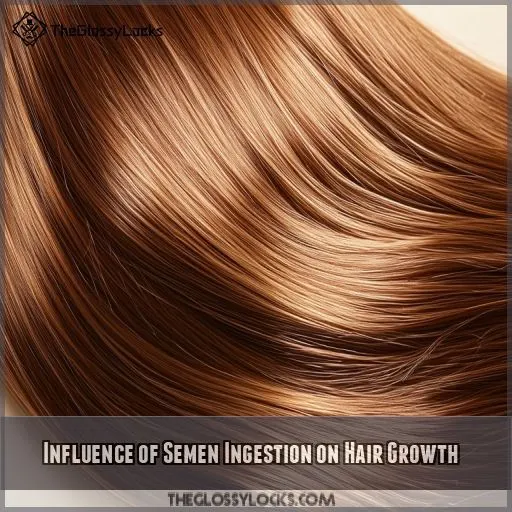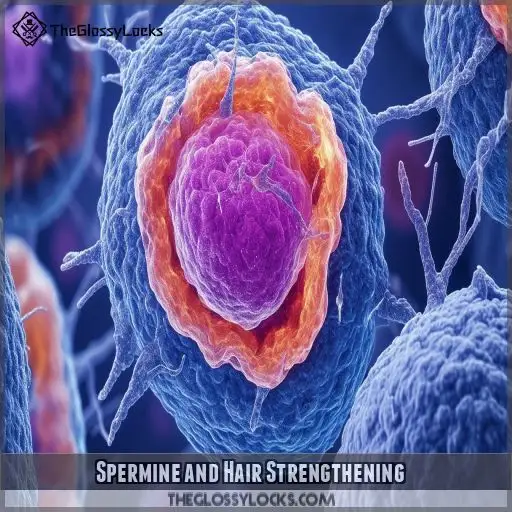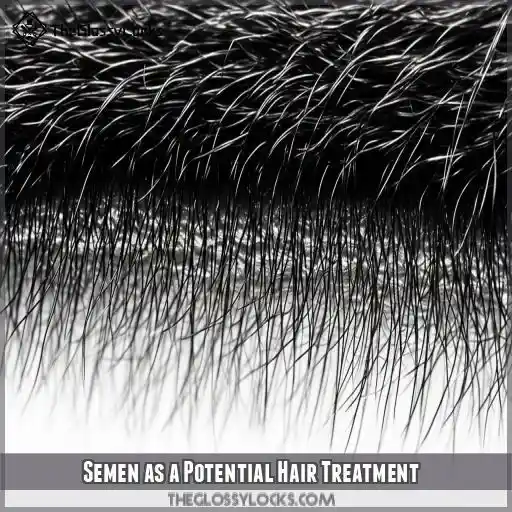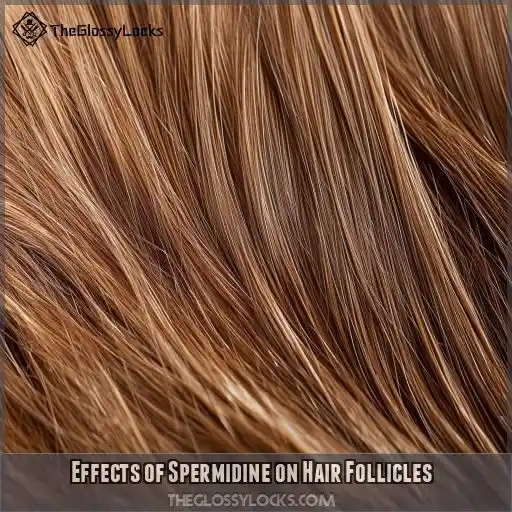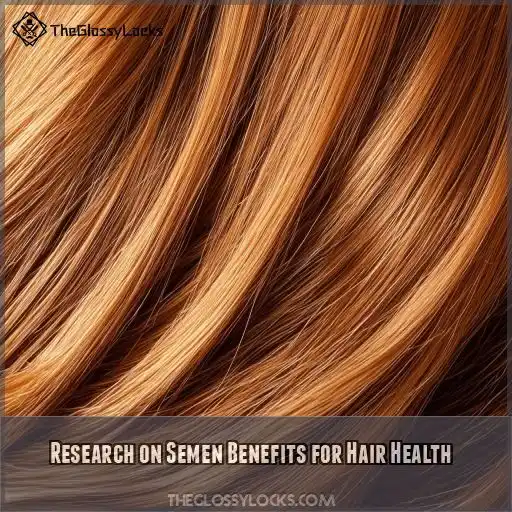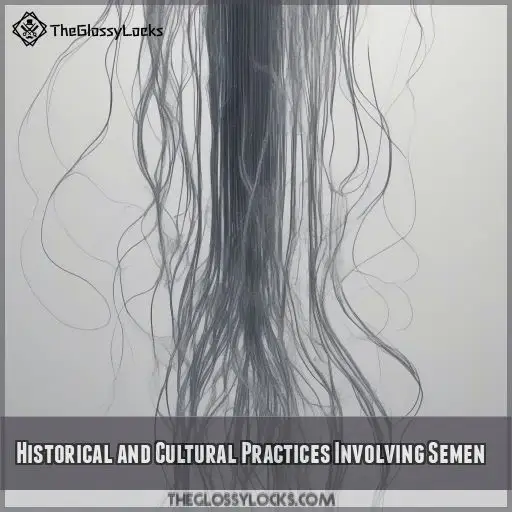This site is supported by our readers. We may earn a commission, at no cost to you, if you purchase through links.
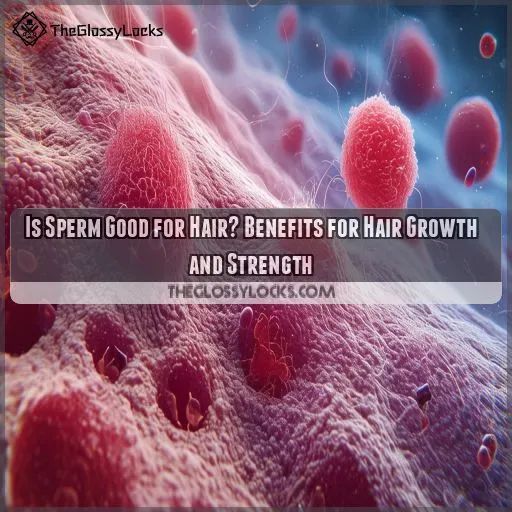 Research reveals an unexpected treasure: sperm and its components may enhance hair growth and strength.
Research reveals an unexpected treasure: sperm and its components may enhance hair growth and strength.
Spermidine, proteins, and nerve growth factors in semen promote hair follicle development and overall hair health.
This article delves into the scientific evidence, explores the biological mechanisms at play, and evaluates semen’s potential as a novel hair treatment.
Intrigued? Read on to uncover the fascinating benefits backed by science.
Table Of Contents
- Key Takeaways
- Is Sperm Good for Hair?
- Spermidine and Hair Growth
- Semen Composition and Hair Health
- Nerve Growth Factors and Hair Follicle Development
- Antioxidant Properties of Sperm and Hair
- Influence of Semen Ingestion on Hair Growth
- Spermine and Hair Strengthening
- Semen as a Potential Hair Treatment
- Effects of Spermidine on Hair Follicles
- Research on Semen Benefits for Hair Health
- Historical and Cultural Practices Involving Semen
- Frequently Asked Questions (FAQs)
- Can sperm help hair growth?
- Is male sperm good for anything?
- Are there benefits in sperm?
- How does a man’s sperm affect a woman’s body?
- What advantages does semen offer for hair?
- Does semen influence hair growth in any way?
- Are there any potential risks when using semen for hair?
- What effect does spermidine in semen have on hair follicles?
- What cultural or historical practices involve semen and hair care?
- Conclusion
Key Takeaways
- Sperm is a potential hair growth superhero: It contains spermidine, a compound that stimulates hair growth and strengthens hair follicles.
- Semen, a protein powerhouse: With over 200 proteins, it nourishes and strengthens hair, giving your mane a shiny appearance.
- Nerve growth factors in semen: These factors promote cell proliferation and reduce inflammation, fostering a healthy environment for hair follicles to thrive.
- Antioxidants in sperm protect hair: By neutralizing free radicals, they keep your locks youthful and radiant, preventing damage.
Is Sperm Good for Hair?
Surprisingly, sperm might be good for hair.
It contains spermidine, which promotes hair growth by inhibiting DHT.
Semen helps develop hair follicles and strengthens hair shafts, reducing breakage and increasing overall hair health.
Antioxidants and nerve growth factors protect against oxidative stress and inflammation, fostering healthier, stronger, and fuller hair.
There is also evidence that ingesting semen provides essential nutrients for hair growth, a less conventional approach.
Ready to uncover more unexpected hair care secrets?
Spermidine and Hair Growth
Spermidine, a compound found in sperm cells, has been linked to stimulating hair growth.
While the exact mechanism is not yet fully understood, it is believed that spermidine may play a role in inhibiting DHT, a hormone known for causing hair loss.
By blocking DHT, spermidine could promote healthy hair follicles and encourage hair growth.
Additionally, the antioxidant properties of spermidine may also contribute to its hair growth-stimulating effects by reducing oxidative stress, creating a favorable environment for hair follicles to thrive.
Semen Composition and Hair Health
Semen contains proteins that can strengthen and shine your hair, contributing to overall hair health. Additionally, its antimicrobial properties can help protect your scalp from infections, promoting a healthier environment for hair growth.
Proteins and Hair Strength
Now, let’s explore the composition of semen and its potential benefits for hair health, particularly focusing on proteins and hair strength.
Semen is a complex fluid containing numerous proteins, which are believed to play a significant role in strengthening hair. While the specific mechanism is yet to be fully understood, it’s hypothesized that the amino acid composition of these proteins may be key to their beneficial effects on hair.
Hair is primarily composed of a protein called keratin, which consists of amino acids linked by disulfide bonds. When hair becomes damaged, these bonds can break, leading to weak and brittle hair. It’s believed that the proteins in semen may help reinforce these bonds, increasing hair strength and reducing breakage.
Additionally, the proteins in semen may also provide external support to the hair cuticle, which is the outermost layer of the hair shaft. By forming a protective layer, these proteins could shield hair from environmental damage, promoting overall hair health.
Antimicrobial Properties
Besides strengthening your hair, sperm’s antimicrobial properties may also benefit your scalp health. The proteins in semen can help fight off bacteria and fungi that cause scalp irritation, hair loss, and dandruff. This can prevent hair breakage and promote overall hair follicle health.
However, it’s important to remember that semen can transmit sexually transmitted infections (STIs) like chlamydia, gonorrhea, HPV, and HIV. Always verify your partner is STI-free to avoid these risks.
Nerve Growth Factors and Hair Follicle Development
Nerve growth factors, particularly those found in sperm, play a significant role in hair follicle development by promoting cell proliferation and reducing inflammation. These factors enhance hair growth by increasing the expression of specific growth factors while inhibiting those that suppress hair growth.
Hair Growth Factors
Now, let’s explore the intriguing world of hair growth factors, specifically focusing on the role of nerve growth factors and hair follicle development. Here’s a concise breakdown:
- Hair growth is influenced by various growth factors, with one key player being spermidine, a compound found in sperm, which has been shown to promote hair growth.
- The anagen phase of the hair cycle is particularly important, and certain factors can induce and prolong this active growth stage, leading to longer and healthier hair.
- While the exact mechanisms aren’t fully understood, the presence of growth factors in sperm suggests a potential link to hair follicle development and overall hair health.
- Topical application of products containing spermidine may enhance hair growth, but more research is needed to confirm this.
Nerve Growth Factor Benefits
Nerve growth factors (NGFs) are essential for hair follicle development.
NGFs have been linked to potential hair growth benefits.
While the direct impact of NGFs on hair follicles requires further research, we do know that NGFs possess antioxidative properties.
These antioxidative properties can help protect hair from oxidative stress and damage.
Additionally, NGFs have been associated with mood-enhancing compounds.
This association may indirectly contribute to a healthier scalp environment that is conducive to hair growth.
Antioxidant Activity
Antioxidants are essential for combating free radicals, which cause oxidative stress and cell damage. Sperm contains antioxidants, including nerve growth factor and spermidine, which may contribute to hair growth and strength. The antioxidant properties of sperm could also reduce signs of aging and prevent diseases linked to oxidative stress. While intriguing, these potential benefits for hair health require further research.
Antioxidant Properties of Sperm and Hair
You might be wondering if there’s any truth to the claim that sperm is good for your hair. Well, it turns out that sperm contains antioxidants, which can benefit your hair in several ways:
- Sperm is rich in polyphenols and flavonoids—these are types of antioxidants known for their potential health benefits.
- These antioxidants protect hair from oxidative stress and damage caused by free radicals.
- Antioxidants in sperm may also promote hair growth and strengthen hair follicles, but more research is needed.
Influence of Semen Ingestion on Hair Growth
While the topical application of semen has been explored for hair health, the impact of ingesting semen is also worth considering. This practice, known as "injaculation," has been a part of ancient traditions and is believed to offer a range of health benefits.
Ingesting semen provides a direct intake of nutrients and compounds that can promote hair growth and overall health. Semen is a rich source of proteins, including strengthening proteins that can enhance hair structure. Additionally, the presence of growth factors and antioxidants in semen may contribute to hair follicle development and protection from oxidative stress.
Here’s a summary of the key nutrients and their benefits for hair growth:
| Nutrient | Benefit for Hair |
|---|---|
| Proteins | Strengthen hair shafts, reducing breakage and improving overall hair strength |
| Growth Factors | Stimulate hair follicle development and promote hair growth |
| Antioxidants | Protect hair follicles and scalp from oxidative damage, maintaining hair health |
| Nutrients | Provide essential nutrients like zinc, potassium, and magnesium for overall hair health |
It should be noted that individual experiences may vary, and the overall effectiveness depends on various factors, including the quantity ingested and the body’s absorption and utilization of these nutrients.
Spermine and Hair Strengthening
Now that we’ve explored the benefits of semen ingestion for hair growth, let’s shift our focus to another intriguing aspect: the role of spermine in enhancing hair strength and shine.
Spermine, a compound found in sperm, has gained attention for its potential hair-strengthening properties. While it’s commonly associated with anti-aging skincare, spermine also boasts benefits for hair health. This antioxidant has been shown to enhance hair shine and strength, contributing to a more vibrant and lustrous mane.
The presence of over 200 proteins in sperm contributes to its strengthening effect on hair. These proteins fortify the hair shaft, enhancing its resilience and overall health. Additionally, the antimicrobial properties of sperm can help maintain a healthy scalp environment, promoting stronger hair growth.
Although bull semen has been incorporated into salon treatments to enhance hair shine and strength, further research is needed to fully understand the benefits of spermine for hair.
Semen as a Potential Hair Treatment
Semen has been proposed as a potential hair treatment due to its rich composition, which includes:
- Over 200 proteins that can strengthen and add shine to hair.
- Polyphenols and flavonoids, which have antioxidant properties.
- VEGF and IGF-1, growth factors that promote hair growth.
- TGF- 21, a cytokine that suppresses hair growth and is inhibited by semen.
While the potential benefits of semen for hair health are intriguing, more research is needed to confirm its effectiveness as a hair treatment.
Effects of Spermidine on Hair Follicles
Spermidine, a compound found in seminal vesicles, has been linked to hair growth and follicle development.
It promotes hair follicle formation, influencing their structure and function.
Spermidine is believed to enhance hair growth by stimulating the development of hair follicles and roots, resulting in deeper and larger follicles.
This leads to increased hair growth, strength, and overall hair health.
While the exact mechanism requires further research, the presence of spermidine in sperm suggests a potential connection between sperm and hair vitality.
Research on Semen Benefits for Hair Health
You’ve probably heard that semen might benefit hair health. Research shows that compounds like spermidine and nerve growth factors in semen can enhance hair growth and strength.
Spermidine Promotes Hair Growth
Spermidine, a compound found in sperm, has been linked to hair growth. Here’s how it works:
- Spermidine promotes hair growth by enhancing the development of hair follicles and hair roots.
- It increases the proliferation and migration of human dermal papilla cells, which are essential for hair follicle growth and maintenance.
- Spermidine also modulates the expression of certain growth factors and cytokines, favoring hair growth over suppression.
NS Extract Benefits
NS extract, derived from prostate glands, has a jelly-like consistency and a white color.
Rich in polyphenols, flavonoids, and phenol compounds, it boosts hair growth and strength.
In vitro studies show that NS extract enhances human dermal papilla cell proliferation and migration, which are essential for hair follicle development.
Animal studies further confirm the ability of NS extract to promote hair growth, with results comparable to, or even surpassing those of minoxidil.
Semens Anti-Ageing Properties
Semen contains an antioxidant called spermine, which reduces wrinkles and smooths skin.
Spermine is so effective at reducing signs of aging that it is synthesized in labs.
It is then sold as an anti-aging ingredient in facial treatments for those seeking to maintain youthful skin.
However, more research is needed to fully understand the potential benefits of semen for skin and hair health.
Historical and Cultural Practices Involving Semen
Semen has been revered in ancient rituals and spiritual practices. It was often seen as an aphrodisiac and a promoter of fertility.
In ancient Greece, semen was considered "divine," influencing religious ceremonies and fertility treatments.
The practice of "injaculation," or retaining semen within the body, has roots in Taoist, Buddhist, Hindu, and ancient Egyptian traditions.
Beyond its spiritual significance, semen once served as invisible ink, with citric acid and thyrotropin-releasing hormone as key components.
Frequently Asked Questions (FAQs)
Can sperm help hair growth?
Yes, it sure can. Spermidine, a compound found in semen, has been shown to promote hair growth and strengthen hair follicles.
Is male sperm good for anything?
Male sperm has been linked to a range of potential health benefits, including improved cognitive function, longevity, and mood enhancement. It’s also said to possess anti-inflammatory and antioxidant properties.
Are there benefits in sperm?
Yes, there are benefits to sperm. For example, a study found that women exposed to semen showed fewer signs of depression. Sperm also contains zinc, which can strengthen and add shine to hair.
How does a man’s sperm affect a woman’s body?
Semen can affect women’s genes and behaviour. It can alter gene expression, immunity, sleep patterns, and sexual receptivity. It may also elevate mood, increase affection, and act as a sleep aid and anti-depressant.
What advantages does semen offer for hair?
Semen is rich in vitamins, minerals, and proteins that can nourish your hair, making it thicker, smoother, and shinier. It can also stimulate hair growth, reduce hair loss, and protect hair strands from environmental damage.
Does semen influence hair growth in any way?
Yes, semen does influence hair growth. Spermidine, a compound found in semen, enhances hair growth and strengthens hair.
Are there any potential risks when using semen for hair?
A stitch in time saves nine."
While semen has been associated with benefits for hair, there are potential risks that should not be ignored.
The risks:
The primary concern is the transmission of STDs. This can occur through oral, anal, or even eye exposure to semen. Thus, it is important to ensure that the semen donor is STD-free.
Additionally, some individuals may experience allergic reactions to semen.
Another consideration is the limited quantity of semen; large amounts may be required to see significant benefits.
What effect does spermidine in semen have on hair follicles?
Spermidine promotes hair growth by enhancing the development of hair follicles and roots.
What cultural or historical practices involve semen and hair care?
There are anecdotal accounts and old wives’ tales suggesting that semen has been used for hair care in certain cultures. However, there’s no scientific evidence supporting this, and it isn’t a widespread practice.
Conclusion
So, is sperm good for your hair?
The answer is a resounding yes.
Scientific evidence highlights the benefits of sperm and its components for hair growth and strength. From spermidine and proteins to nerve growth factors, semen contains a plethora of ingredients that promote hair follicle development and overall hair health.
Thanks to its antimicrobial properties and antioxidant activity, sperm-based treatments could revolutionize hair care routines.


